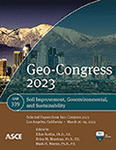Effect of Exposure to Water at Different Temperatures during Curing on the Strength of Cement-Treated Soil
Publication: Geo-Congress 2023
ABSTRACT
This paper presents unconfined compressive strength (UCS) test results of cement-treated soil cured under different curing conditions. During curing in water at different temperatures (21.1°C and 45.0°C), the samples for short-term curing were demolded at different times and then placed into the water again to continue the curing. UCS tests were conducted on all the short-term curing samples after an entire curing time of 28 days. On the other hand, for long-term curing, some samples were demolded at seven days and exposed to the water for further curing, while the other samples were sealed by a plastic mold during the entire curing period without any exposure to the water. The entire curing times for the long-term curing were between 100 and 400 days. The UCS test results showed that for the short-term curing, a sample demolded later and exposed to water for a short period was stronger than the sample exposed to water early. This trend was more evident at a high temperature (45.0°C), but the differences in the strength were small. For the long-term curing, a sample cured in the mold at room temperature (21.1°C) for the entire curing time had a higher UCS than the sample demolded at seven days and exposed to water for further curing, while there was no demolding effect at 45.0°C. The test results implied that a cement-treated soil sample cured in the mold can have a higher strength than a soil-cement column for the wet method of deep mixing that is exposed to materials around the column depending on curing conditions.
Get full access to this article
View all available purchase options and get full access to this chapter.
REFERENCES
Ahnberg, H., Bengtsson, P.-E., and Holm, G. (1989). “Prediction of strength of lime columns.” International Conference on Soil Mechanics and Foundation Eng., 1327–1330.
ASTM. (2011). Standard Practice for Classification of Soils for Engineering Purposes (Unified Soil Classification System). D2487-11, ASTM International, West Conshohocken, PA.
ASTM. (2016). Standard Test Method for Unconfined Compressive Strength of Cohesive Soil. D2166/D2166M-16, ASTM International, West Conshohocken, PA.
Babasaki, R., Suzuki, K., Saitoh, S., Suzuki, Y., and Tokitoh, K. (1991). “Construction and testing of deep foundation improvement using the deep cement mixing method.”, Publ by ASTM, 224–233.
Babasaki, R., Terashi, M., Suzuki, T., Maekawa, A., Kawamura, M., and Fukazawa, E. (1996). “JGS TC Report: Factors influencing the strength of improved soil.” International Conference on Soil Improvement Geosystems, Grouting and Deep Mixing, 913–918.
Bruce, M. E. C., Berg, R. R., Filz, G. M., Terashi, M., Yang, D. S., and Collin, J. G. (2013). Federal Highway Administration Design Manual: Deep Mixing for Embankment and Foundation.
Clare, K. E., and Pollard, A. E. (1954). “The Effect Of Curing Temperature On the Compressive Strenght Of Soil-Cement Mixtures.” Géotechnique, 4(3), 97–106.
Hodges, D. K., Filz, G. M., and Weatherby, D. E. (2008). Laboratory mixing, curing, and strength testing of soil-cement specimens applicable to the wet method of deep mixing.
Jacobson, J. R., Filz, G. M., and Mitchell, J. K. (2003). Factors Affecting Strength Gain in Lime-Cement Columns and Development of a Laboratory Testing Procedure. Virginia Center for Transportation Innovation and Research.
Ju, H. (2019). Influence of Curing Temperature on Strength of Cement-treated Soil and Investigation of Optimum Mix Design for the Wet Method of Deep Mixing.
Kitazume, M., Nakamura, T., Terashi, M., and Ohishi, K. (2003). “Laboratory Tests on Long-Term Strength of Cement Treated Soil.” Grouting and Ground Treatment: Proceedings of the Third international Conference, American Society of Civil Engineers, New Orleans, LA, 586–597.
Kitazume, M., and Terashi, M. (2013). The Deep Mixing Method. The Deep Mixing Method, CRC Press.
Le Kouby, A., and Guimond-Barrett, A. (2015). “Influence of curing conditions on the stiffmess and strength of cement-stabilized soils.” Conference Deep Mixing 2015, Deep Foundation Institute, San Francisco, CA, 661–670.
Nevarez-Garibaldi, R., Miller, D., and Filz, G. (2018). Influences of Mixture Proportions and Test Conditions on the Strength and Stiffness of Wet-Mixed Soil and Cement,.
Pham, V. N., Turner, B., Huang, J., and Kelly, R. (2017). “Long-term strength of soil-cement columns in coastal areas.” Soils and Foundations, Elsevier, 57(4), 645–654.
Popiel, C. O., Wojtkowiak, J., and Biernacka, B. (2001). “Measurements of temperature distribution in ground.” Experimental Thermal and Fluid Science, Elsevier, 25(5), 301–309.
Porbaha, A. (1998). “State of the art in deep mixing technology: part I. Basic concepts and overview.” https://doi.org/10.1680/gi.1998.020204, Thomas Telford - ICE Virtual Library, 2(2), 81–92.
Shihata, S. A., and Baghdadi, Z. A. (2001). “Long-Term Strength and Durability of Soil Cement.” Journal of Materials in Civil Engineering, American Society of Civil Engineers, 13(3), 161–165.
Terashi, M. (1997). “Theme lecture: Deep mixing method- Brief state of the art.” Proc. of the 14th International Conference on Soil Mechanics and Foundation Engineering, 2475–2478.
Zhang, R. J., Lu, Y. T., Tan, T. S., Phoon, K. K., and Santoso, A. M. (2014). “Long-Term Effect of Curing Temperature on the Strength Behavior of Cement-Stabilized Clay.” Journal of Geotechnical and Geoenvironmental Engineering, American Society of Civil Engineers, 140(8), 04014045.
Information & Authors
Information
Published In
History
Published online: Mar 23, 2023
Authors
Metrics & Citations
Metrics
Citations
Download citation
If you have the appropriate software installed, you can download article citation data to the citation manager of your choice. Simply select your manager software from the list below and click Download.
